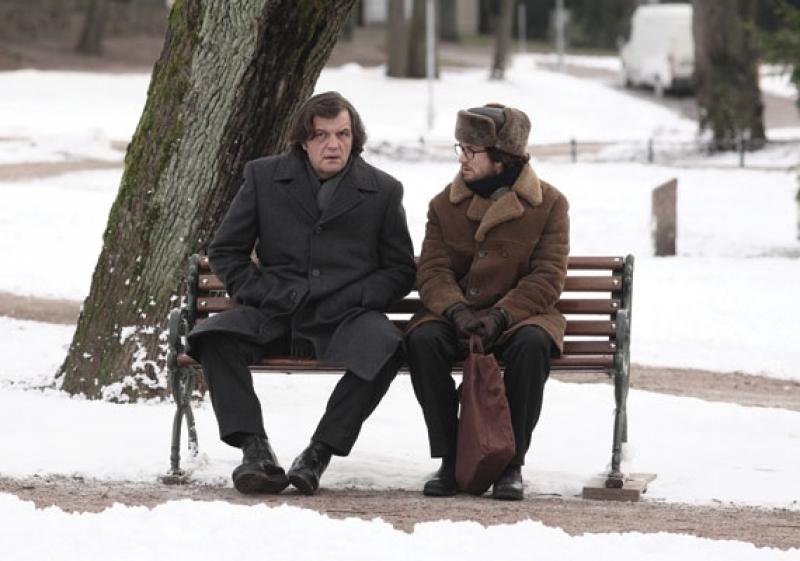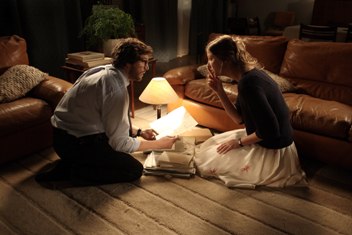Farewell | reviews, news & interviews
Farewell
Farewell
The spy who came in from reality: a gripping real-life psychological thriller

Midway through Farewell, a civilian who is aiding a KGB spy is told by his nervous wife, “I married an engineer. Not James Bond.” In other films, this might be a cheap line, a postmodern quip; here it is spoken in earnest, and reflects the many nuances of a wonderfully retro spy drama.
While harking back to those fictions, Christian Carion’s film also carries the kudos of true events. It is loosely based on the book Bonjour Farewell, an investigation by Russian journalist Sergei Kostine of the explosive defection in the early Eighties of a high-ranking KGB agent, Vladimir Vetrov. Having made contact through a French businessman, Vetrov handed thousands of secret documents to the West, exposing his country’s spy network and, some suggest, helping to bring down the Soviet Union.
Moscow, 1981. French engineer Pierre Froment (Guillaume Canet) is at the circus with his wife Jessica (Alexandra Maria Lara, pictured below with Canet) and their daughter. Halfway through the performance, he slips out to his car to conduct what he thinks is a one-off favour for his boss. Froment has no idea what he’s getting himself into, and is none too pleased when he finds out. For his part, the man lurking on the back seat, KGB colonel Sergei Gregoriev (Emir Kusturica), thinks he’s being hooked up with a French spy. “They sent me an amateur,” he grumbles. “Typically French.”
But Grigoriev decides that this is a blessing in disguise. Who would suspect the inexperienced Froment, not least when the pair will meet in broad daylight, in parks and at national monuments, for all to see? At first, he doesn’t so much court the Frenchman as impose himself, jumping into Froment’s car at traffic lights, stolen secrets in his hand. Slowly the younger man gets hooked, ostensibly by the promise of promotion, one suspects more by the thrill, and by the magnetism of the newly codenamed “Farewell”, a man who doesn’t want asylum or cash for his troubles, but champagne, French poetry and tapes of Queen.
 From here on, the story flexes its muscles, moving between Moscow, Paris and Washington, as Grigoriev’s material – revealing the shocking extent to which Russia has infiltrated the West – is passed first to François Mitterrand (Philippe Magnan), then by Mitterrand to Ronald Reagan (Fred Ward), each leader seeing his own leverage in the revelations.
From here on, the story flexes its muscles, moving between Moscow, Paris and Washington, as Grigoriev’s material – revealing the shocking extent to which Russia has infiltrated the West – is passed first to François Mitterrand (Philippe Magnan), then by Mitterrand to Ronald Reagan (Fred Ward), each leader seeing his own leverage in the revelations.
The director’s handling of mode and tone is one reason why this film is so unusual. Carion shifts deftly between the domestic and the political, the droll and the dramatic, sweeping history (Gorbachev also makes an appearance, heralding his perestroika) and the individual tragedy of one man, Grigoriev, ready to sacrifice everything for a country he feels has lost its way. He also shows how the primary mechanism of espionage, deceit, infects all aspects of life. “I live in lies, and solitude,” says Grigoriev, who is not only betraying his country, but cheating on his wife. Pierre has also learned to lie at home, continuing to spy against his wife’s wishes, thus risking his marriage.
The politicians, of course, all lie to each other, friend or foe. It’s a nice touch to have Fred Ward’s very rum Reagan (who was known to watch westerns as a way of mulling over key decisions) show a colleague the keynote scene of Ford’s The Man Who Shot Liberty Valence – in which we see Wayne, not James Stewart, kill the villain; the actor-turned-president knew very well the importance of “point of view”.
Carion’s previous film, Merry Christmas, was about the Yuletide truce during World War One, when French, German and British soldiers played football in no-man’s-land – like Farewell, a story that would be deemed preposterous were it not, in fact, true. As in that film, Carion has his actors speak the language of their characters – both leads moving with aplomb between French and Russian. This lends much credence to proceedings, and to the performances. The fellow actor-directors Canet and Kusturica are top class, particularly the latter, whose warts-and-all portrayal of a common type – the idealist-philanderer – is complex and unremittingly charismatic.
As Daniel Craig’s Bond and Matt Damon’s Bourne have kept spydom muscular, it’s a brave move to return to the quieter, talkier machinations we have here. And with the remake of Tinker, Tailor, Soldier, Spy later this year, it’s good to see the Cold War warming up again.
Watch the trailer to Farewell
Share this article
The future of Arts Journalism
You can stop theartsdesk.com closing!
We urgently need financing to survive. Our fundraising drive has thus far raised £33,000 but we need to reach £100,000 or we will be forced to close. Please contribute here: https://gofund.me/c3f6033d
And if you can forward this information to anyone who might assist, we’d be grateful.

Subscribe to theartsdesk.com
Thank you for continuing to read our work on theartsdesk.com. For unlimited access to every article in its entirety, including our archive of more than 15,000 pieces, we're asking for £5 per month or £40 per year. We feel it's a very good deal, and hope you do too.
To take a subscription now simply click here.
And if you're looking for that extra gift for a friend or family member, why not treat them to a theartsdesk.com gift subscription?
more Film
 Misericordia review - mushroom-gathering and murder in rural France
A deadpan comedy-thriller from the director of ‘Stranger by the Lake’
Misericordia review - mushroom-gathering and murder in rural France
A deadpan comedy-thriller from the director of ‘Stranger by the Lake’
 theartsdesk Q&A: filmmaker Joshua Oppenheimer on his apocalyptic musical 'The End'
The documentary director talks about his ominous first fiction film and why its characters break into song
theartsdesk Q&A: filmmaker Joshua Oppenheimer on his apocalyptic musical 'The End'
The documentary director talks about his ominous first fiction film and why its characters break into song
 DVD/Blu-ray: The Substance
French director Coralie Fargeat on the making of her award-winning body-horror movie
DVD/Blu-ray: The Substance
French director Coralie Fargeat on the making of her award-winning body-horror movie
 A Working Man - Jason Statham deconstructs villains again
A meandering vehicle for the action thriller star
A Working Man - Jason Statham deconstructs villains again
A meandering vehicle for the action thriller star
 The End review - surreality in the salt mine
Unsettling musical shows the lengths we go to avoid the truth
The End review - surreality in the salt mine
Unsettling musical shows the lengths we go to avoid the truth
 La Cocina review - New York restaurant drama lingers too long
Struggles of undocumented immigrants slaving in a Times Square kitchen
La Cocina review - New York restaurant drama lingers too long
Struggles of undocumented immigrants slaving in a Times Square kitchen
 Blu-ray: Lifeforce
Tobe Hooper's frenzied, far out space sex vampire epic
Blu-ray: Lifeforce
Tobe Hooper's frenzied, far out space sex vampire epic
 Brief History of a Family review - glossy Chinese psychological thriller feels shallow
Immaculately crafted family drama aimed at international art house audiences
Brief History of a Family review - glossy Chinese psychological thriller feels shallow
Immaculately crafted family drama aimed at international art house audiences
 Two Strangers Trying Not to Kill Each Other review - a portrait of photographer Joel Meyerowitz
Scenes from a seemingly picture-perfect marriage
Two Strangers Trying Not to Kill Each Other review - a portrait of photographer Joel Meyerowitz
Scenes from a seemingly picture-perfect marriage
 The Alto Knights review - double dose of De Niro doesn't hit the spot
Barry Levinson's Mafia saga drifts gently into the sunset
The Alto Knights review - double dose of De Niro doesn't hit the spot
Barry Levinson's Mafia saga drifts gently into the sunset
 theartsdesk Q&A: director François Ozon on 'When Autumn Falls'
The modern French master reflects on ageing, useful lies and country secrets in his new slow crime film
theartsdesk Q&A: director François Ozon on 'When Autumn Falls'
The modern French master reflects on ageing, useful lies and country secrets in his new slow crime film
 Santosh review - powerful study of prejudice and police corruption
Sandhya Suri tackles the caste divides and misogyny of Indian policing
Santosh review - powerful study of prejudice and police corruption
Sandhya Suri tackles the caste divides and misogyny of Indian policing

Add comment